We took a taxi into the small town, leaving the asphalt road behind and turning onto a dusty path.
The path was covered in dust, flanked by low, densely packed buildings. Calling them buildings might be generous—they were more like square enclosures made from broken walls and door panels. The entrances were cluttered with stones and plastic, which from any distance looked like piles of trash or a construction site about to begin. The road itself was very basic—just sandy soil scattered with various debris, most commonly dog and sheep droppings, along with some plastic waste. The droppings had been baked hard by the sun and heat, turning almost stone-like, odorless, and flies didn’t bother to come.
 Dirt road
Dirt road
I tried to reconcile these ever-present dirt roads and buildings with my own experiences, and my conclusion was that this place resembled a Chinese “XiaoQu” (residential compound) or a German 30km/h residential zone—but in an Egyptian style. By blending these impressions, I gradually came to accept this new form of neighborhood. The housing here is extremely basic—utterly simple and devoid of design—but highly practical and perfectly suited to the local climate and culture. People who have lived here for generations are masters of “form follows function,” but here, it’s all function with no form.
Walking these dirt roads always feels like a small adventure. During the day, flowers and kittens suddenly appear on the walls, and the air carries the faint scent of sheep droppings. At night, under dim light and darkness, I carefully dodge the droppings and trash scattered on the sandy ground. Once you get used to it, it’s not so bad—it has its own unique charm.
Of course, not all buildings here are like that. The hostel we stayed at was quite different. It was a small villa, square and neat, with small windows. The exterior walls and courtyard were clean and tidy, with flowers and greenery growing taller than our heads, spreading widely and visible from afar. There are quite a few similar small buildings in town, but most have been converted into Airbnbs or hostels. These are mostly clustered in the town center. Though the facilities aren’t the newest, they’re fully functional and show many modern touches.
Larger resorts are located on the outskirts of town. We didn’t like those places much. Every time we passed by and peeked inside, they felt deserted. Railings and facilities were badly corroded by the sea breeze. Despite having many rooms, few people seemed to live there—it was cold and empty. In short, if you ever come here, I highly recommend staying in a hostel or Airbnb rather than a resort hotel.
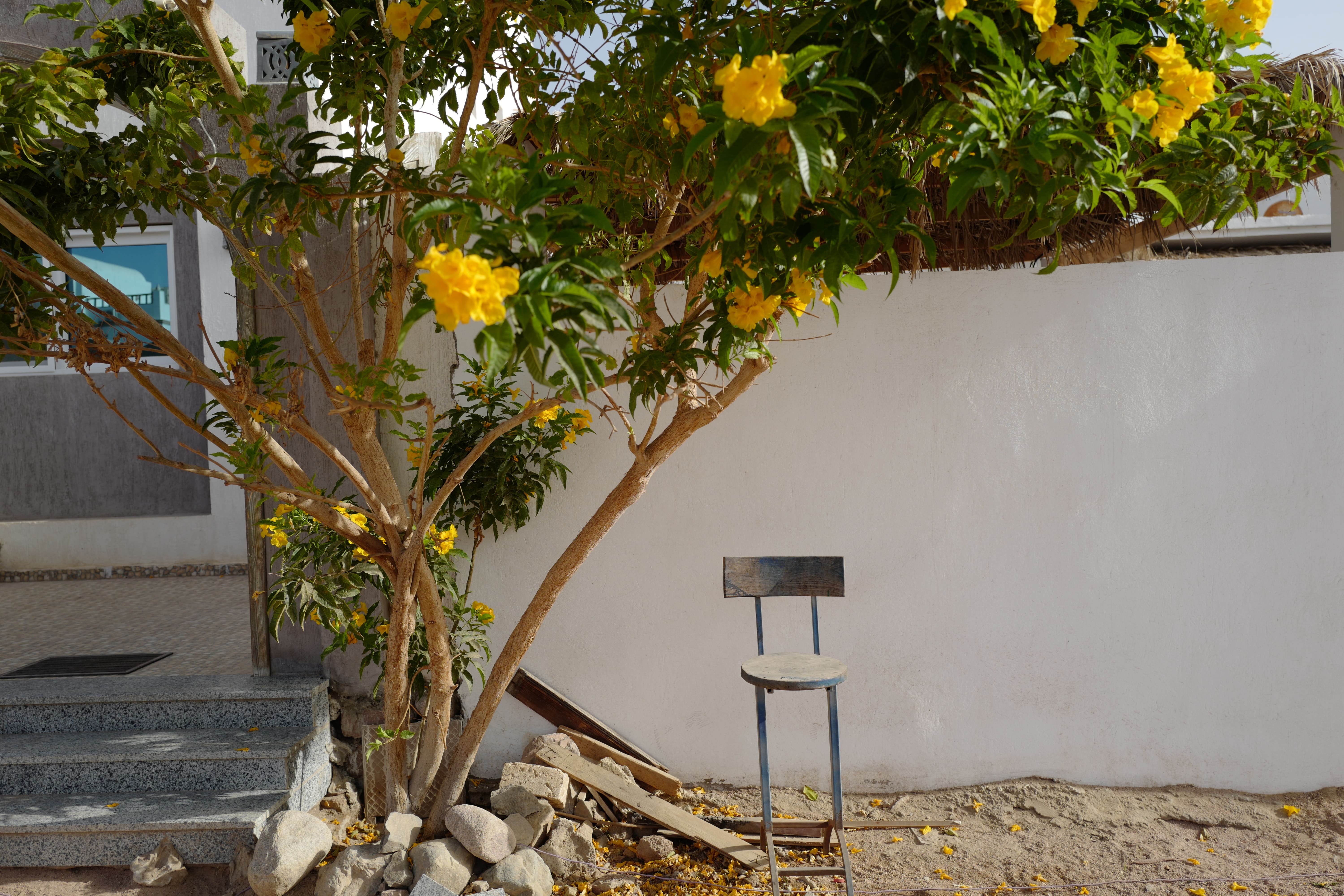 Some courtyards have more refined doorways
Some courtyards have more refined doorways
After getting out of the car, the reserved but attentive driver helped us carry our luggage. Since we arrived too early, we had to knock repeatedly and call to wake people up. After a few minutes, the person in charge, Mr. Z, opened the door, looking sleepy but greeting us warmly. After thanking the driver, we left our luggage in the hallway. Mr. Z briefly introduced the hostel’s facilities and rules.
Mr. Z is a tall, dark-skinned Egyptian youth, usually dressed in sportswear, responsible for all hostel affairs. Every morning when passing through the living room, we’d see him lying on the sofa, either napping or listening to music. But reliable sources say this isn’t laziness — he works out early every day and only rests on the sofa after finishing his routine. What we saw was him relaxing after a workout.
What we appreciated most was his encyclopedic knowledge. From hostel management to organizing activities, even small questions like where to print documents, he knew the answers and responded quickly. In this place with limited internet access, map apps barely work and are often outdated. For the latest firsthand info, you have to ask him. We felt lucky to choose this hostel —- a solid, friendly, and reliable local who made our trip smoother.
In the hostel’s living room, right by the main door, there’s a water dispenser. I especially liked the free ice water and drank several cups every time I returned. The living room had several sofas and a TV. Further inside was the kitchen and a long table. The red tea in the kitchen was free, but other instant drinks required self-payment.

Morning at the hostel
Egyptian red tea is a powdered tea called “El Arosa Tea,” sold cheaply in large bags. To make it, you scoop about half a spoon of powder, no filter needed, pour hot water over it, and wait for the water to turn a bright sunset red before drinking. Compared to red tea, coffee—which is common in Europe—doesn’t seem to be popular here. At least, the coffee I’ve had these days was mediocre and lacked aroma, while the red tea was very satisfying.
The hostel’s backyard is very pleasant, with comfortable sofas, mats, and long tables and benches. Nearby greenery adds a natural touch. The surrounding walls block sunlight, so even on hot days, the shade feels cool.
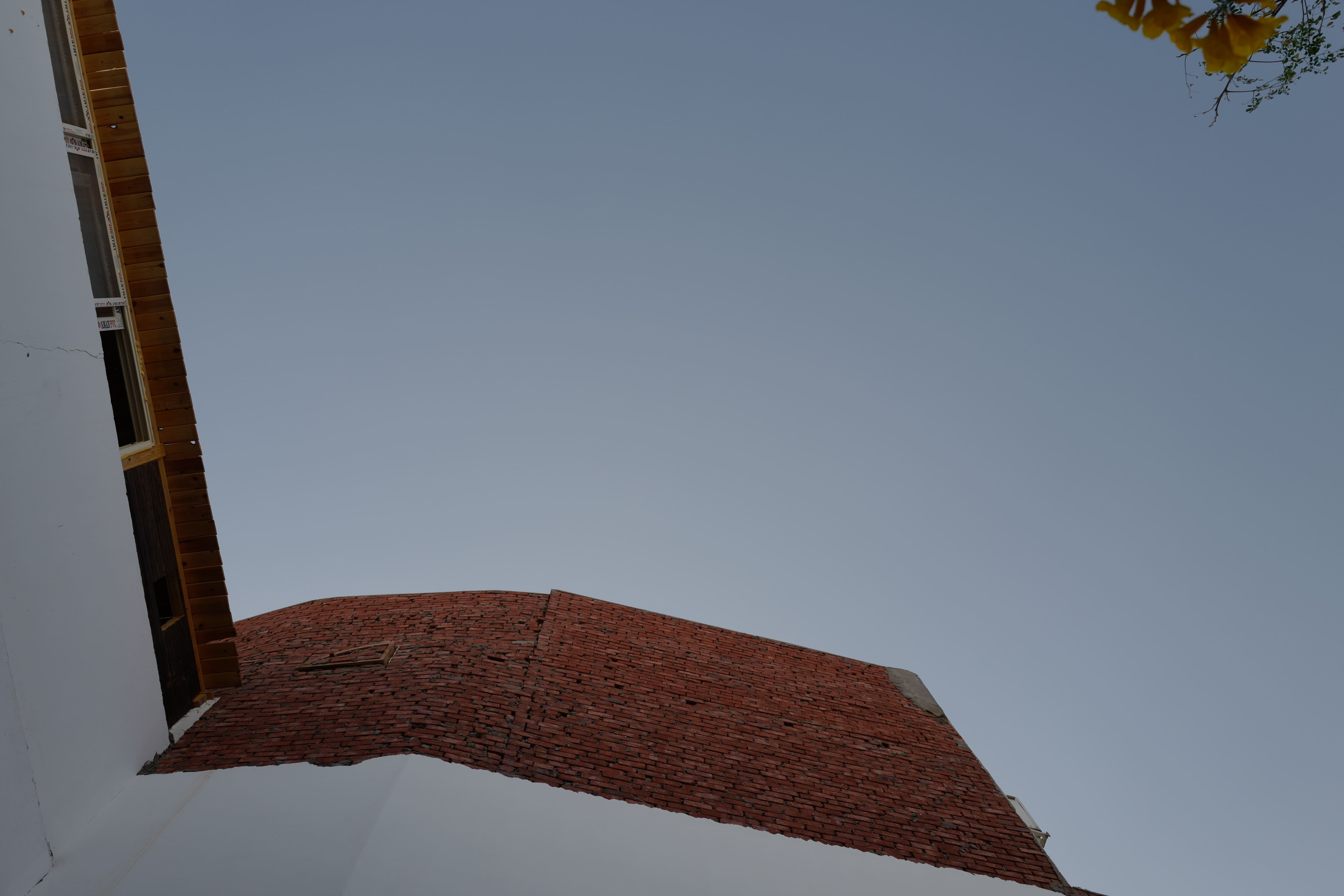
Courtyard wall
People staying here often lounge in the courtyard, eating, drinking tea, and chatting. I do the same. When I see someone, I try to strike up a conversation, though I’m not very good at it—especially when they’re focused on screens or engaged in lively discussions. I’ve never figured out how to start or end casual chats smoothly. They feel like dreams—no clear beginning or end when recalled.
I’m like a fish, drifting without strong opinions, chiming in when there’s a topic, and slipping away when I can’t think of new ideas or express complex thoughts. Socializing is more challenging than enjoyable—thinking of topics, joining discussions, expressing opinions while trying not to offend. Doing this in a non-native language makes it even more exhausting.
Paradoxically, socializing is a skill—the more you do it, the better you get; if you don’t, you get worse. So the environment pushing me to change is crucial. I feel that living in Germany sometimes makes it hard to sustain this positive evolution. When I speak broken German, I often get silence or indifferent responses. I know there’s no malice, but without feedback, I never know if I’m understood or just talking to myself. In contrast, people from sunny places give me more positive, encouraging responses. Even if our languages don’t fully connect, like the sun’s energy spreading to all, I can sense their emotions and empathy.
Conversation is like water flow. You can stir it when calm or join an existing current, upstream or downstream. The key is to observe the flow and find the right moment to join or leave. I’m glad this trip gave me chances to interact with different people, boosting my confidence and letting me truly feel the flow of human connection.
Since we arrived early and check-in was still hours away, to avoid disturbing others, we moved from the living room to the backyard, found a soft mat, and lay down. Then a light sound caught our attention—a skinny calico cat jumped down from the high backyard wall and nimbly came over. As a cat lover, I couldn’t resist petting it all over, enjoying the moment.
Later, Mr. Z told us its name was Orca. Like other Egyptian kittens, its favorite pastime is scavenging. After a few days’ observation, we noticed it often waits by the glass door in the backyard. When someone comes in or out with plates or cups, it immediately approaches, rubbing against their legs. Once they sit, it rubs its head against chairs and table corners, meowing coquettishly. I thought it was showing affection to me, but later realized it’s just a snob, only interested in people with food. Its greed shows when it gets food—its meows become louder and more aggressive, and it scratches with sharp claws, truly living up to its name “Orca.” Knowing this, we became more cautious, giving it space and resisting its cute temptations.
 Orca walking
Orca walking
Dahab has many cats and dogs roaming the streets. Dogs are large and noisy, often barking and fighting. I’ve witnessed many dog fights. Cats, in contrast, are slimmer and more agile, rarely fighting or gathering unless food is involved. They’re also very clean. Once I saw a kitten poop on the beach, cover it with sand, elegantly rub its butt, and walk away. Its grace makes me wary; I’m always cautious walking barefoot on the beach, afraid of stepping on fresh “landmines.”
Compared to the lazy Turkish cats, these cats are wilder and will do anything for food. Some bold cats even jump onto tables and plates. At those times, we have to be firm and shoo them away; if we’re soft, they’ll take over. Of course, some cats are gentler, quietly watching us eat and leaving when no food is left. We reward these well-behaved cats with chicken or beef to commend their good manners.
By the way, local cats have their own dialect. Unlike ordinary meows, “Psst” means “come here.” Locals taught me this. If you want Egyptian cats to approach, just say “Psst” a few times.
Orca, lazy and free-spirited, after being petted, climbed along the wall and left. We lay on the soft mat, hats over our eyes, half asleep. The flies here have evolved into experts over generations. They occasionally land on skin, and normal, rhythmic swatting doesn’t work. You have to wave vigorously and unpredictably to make them fly off. Annoyed and unable to sleep, we decided to take a walk and enjoy the town’s early morning atmosphere.
The distance from our place to the sea is short, and the coastal road is straight, but buildings are tightly packed, making it hard to find a path through. After many twists and turns, we finally reached the shore. Early morning, the sun had just risen, the wind was light, the sea calm, and the temperature comfortable.
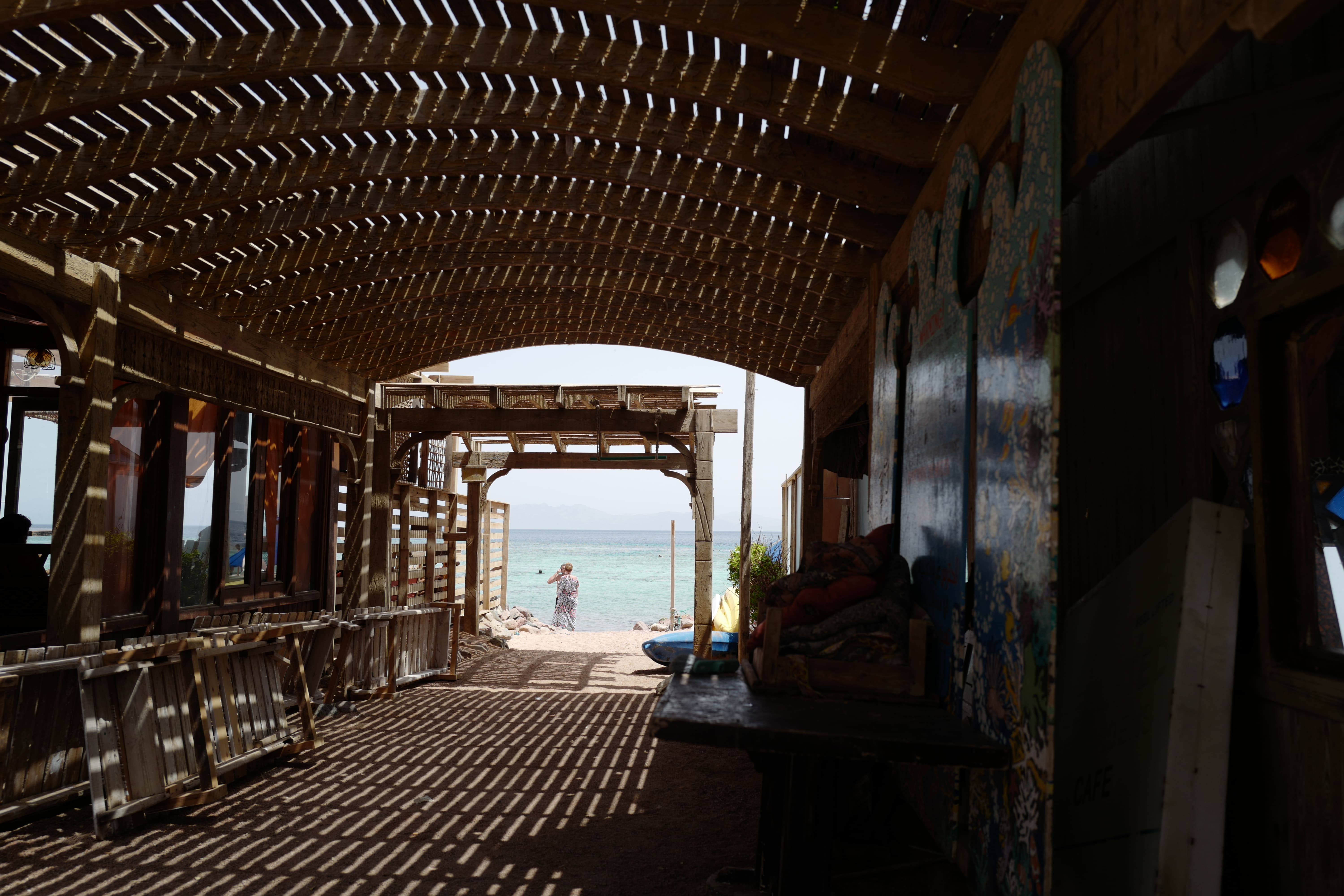 A few corners of the coffee shop street
A few corners of the coffee shop street
The street was quiet, with only a few joggers and some people in wetsuits chatting in small groups. Coffee shops and dive shops lined the street, most still closed, with only a few cleaning behind glass windows. The coffee shops were mostly seaside, facing the beach, with carpets and mats laid out and small tea tables set up as seating. Near the shallow water, there were regular tables, chairs, and beach loungers for swimming or sunbathing.
Being new, we didn’t know how to pay card or cash and it was too early to find anyone to ask. We hesitated along the coast, then, exhausted, saw two people sleeping on a beach carpet and decided to join them, lying down by the sea.
We greeted the owner, ordered two iced coffees, and lay down under the umbrella. After a while, the owner brought two plastic cups. We took them and weakly thanked him. The coffee tasted awful, but sleep was more important. Holding our bags, we fell asleep to the sound of waves.
The beach mats were dusty and worn, none intact. The fabric at holes was frayed, with gray cotton fibers exposed and floating. The carpets hadn’t been cleaned for a long time, stained with various colors, obscuring the original red patterns. I guessed that fresh water is scarce here, so washing carpets is costly and inefficient. Or maybe the strong sunlight sterilizes them naturally, so people don’t worry about bacteria. At first, I thought only a few shops were like this, but after visiting more, I found most restaurants and coffee shops were the same. Still, no one sees it as a problem. People come in, buy food and drinks, and sit or lie down as usual.
I’m used to city life, where people expect everything to be clean. If something is stained, it must be cleaned immediately before use. Advertisements all promote cleanliness and whitening. “No stains” is a city norm, common sense for using things, and no one questions why things must be clean or why only clean things can be used. Compared to Egyptian carpets, whether dirty or torn isn’t a concern. The key is whether it exists. If it does, you can sit or lie down and rest. If not, you get up and find another place.
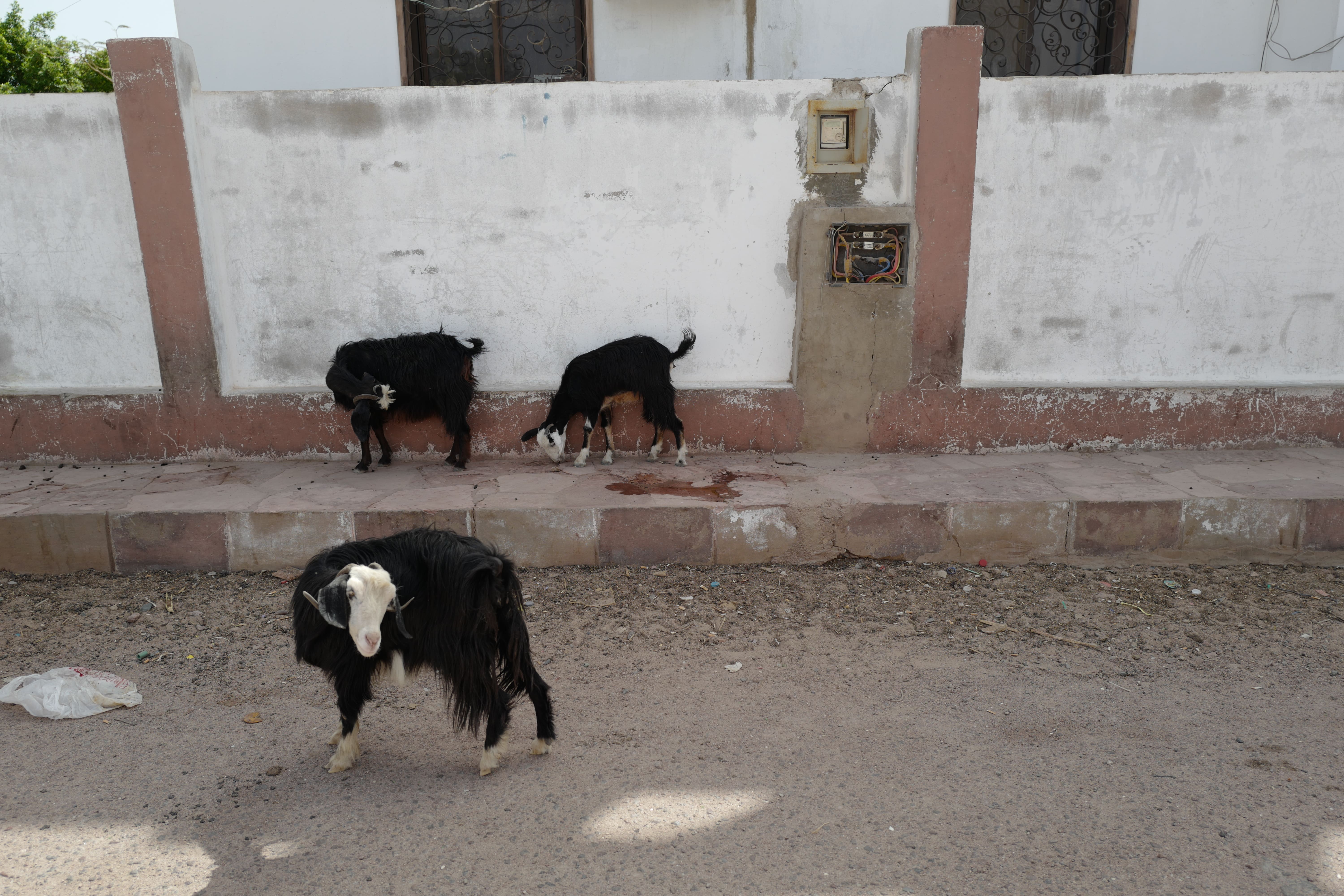 Sheep on the road
Sheep on the road
Back in the city, I rode past a high-end furniture store. The huge glass window displayed various luxurious sofas and chairs, made from different materials and shapes. Seeing so many options, I suddenly thought of the Egyptian carpets and mats—dirty, worn, and only offering sitting or lying positions. Comparing the two, I felt a strange shame. The carpets blend naturally with their environment, while the furniture caters to the artificial ecology humans build in cities, with concrete and man-made activities. Different environments and occasions require different sofas or chairs. If they don’t fit, people frown and leave.
I don’t know how long I closed my eyes before waking again. The surroundings were still calm. A few wild big dogs gathered nearby. I dared not move, letting them sniff around, creating a curious spectacle of five dogs circling “Kang” (me). After a few minutes, finding no food, they ran off in a pack.
Two men sleeping ahead woke up. One chatted with the owner in Arabic, apparently a local. Soon, he skillfully brought a hookah and placed it beside their leftover beer. Just waking up, mixing smoke and alcohol—I couldn’t help but admire him inwardly.
He looked around, saw no one else, walked over to us, and started a conversation. We introduced ourselves briefly and chatted about various things, though I don’t recall details—probably first impressions of the town.
I remember when discussing currency exchange, he said he worked in anti-money laundering, just off night shift, and came straight to the beach to relax. Using imperfect English, he warned us not to exchange money on the black market because the rates are terrible. The safest way is to go to the bank’s teller window.
Seeing the time, we thanked him and prepared to leave. Before parting, he warmly shook our hands and added, “There will be techno music nearby tonight, you’re welcome to come.”
Since childhood, I was taught to be wary of strangers, especially those who approach warmly, always warned “they have ulterior motives.” So when smiling strangers approach on the street, regardless of age or gender, I instinctively keep my guard up. Life in Germany has reinforced this: strangers are either salespeople or beggars. Over time, I almost forgot that genuine warmth is a simple, kind trait that can bring people closer.
I don’t blame those who fake friendliness for gain. I just feel a little sad—that pure humanity has been twisted into a sharp tool, and its true value and gentleness are rarely appreciated.
During our stay, similar chats happened almost daily. Whether with friends or strangers, I truly felt the kindness and warmth from people’s hearts. From an individual perspective, we may all be ordinary, but these unexpected conversations make every moment shine uniquely, making everyone here feel special, glowing with extraordinary light.
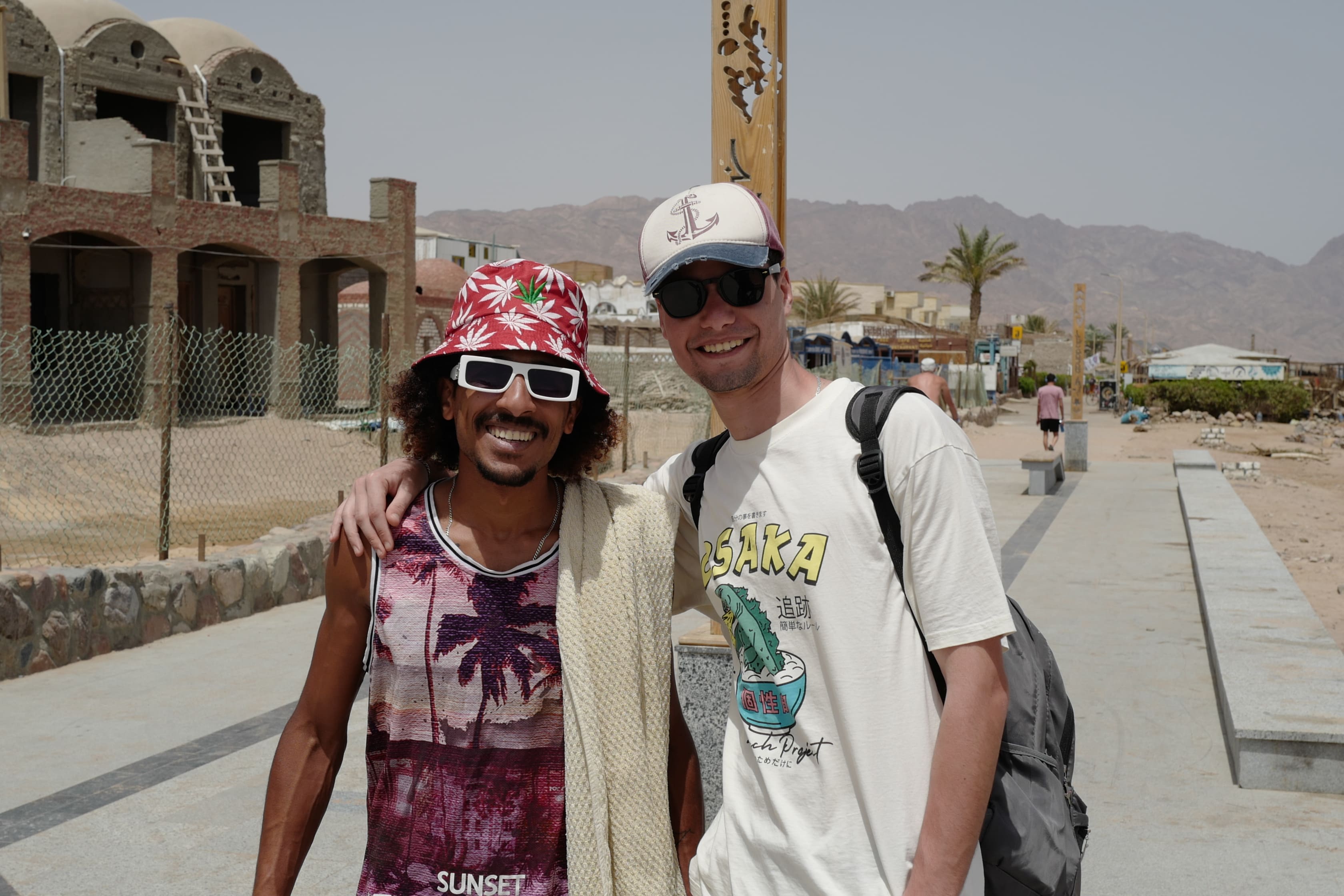 Unknown local youths, but I took their photo
Unknown local youths, but I took their photo
Before the sun rose too high, we returned to the hostel. Though it wasn’t check-in time, Z told us the room was ready, so we could move in early. I couldn’t help but give him a thumbs-up and sincerely thanked him; the timing was just right.
Inside, we tossed our luggage aside, ignoring dust and sweat, and collapsed onto the freshly made bed. Opening and closing my eyes, I realized it was only noon, but my body and mind felt like they’d crossed centuries. That wave of exhaustion reminded us—this journey had only just begun.
Here’s the contact info for hostel tranquilo, I think you’ll like it there :D

